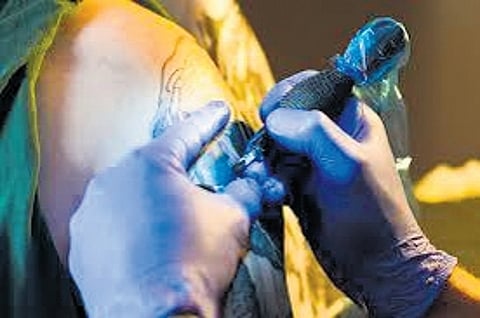

BENGALURU: Days after laboratory tests on eight tattoo ink samples collected from various locations in Karnataka revealed the presence of 22 heavy metals, including selenium, chromium, platinum, and arsenic, along with residual solvents, the State Health Department has written to the Union Health Ministry, calling for urgent regulations on tattooing, including licensing for artists and studios.
Currently, tattoo inks are not classified or regulated under any specific rules as cosmetics. However, the Drugs and Cosmetics Act, 1940, defines cosmetics as substances applied to the human body to cleanse, beautify, or alter appearance. Since tattoo inks are injected into the skin for aesthetic purposes, the department argued that it should be classified as cosmetic and brought under regulatory control.
A major concern is that India currently has no standards for tattoo inks, and most of the inks used in the country are imported without regulation. The sterility of these inks cannot be verified because the presence of colourants makes it difficult to test for contamination, the department wrote, adding that the investigation into the samples also found that a single container of tattoo ink is often used for multiple customers, further increasing the risk of infections. “The needles used for tattooing have been sent for sterility testing, and the results are awaited,” the health department elaborated.
The test results have raised serious health concerns, the letter stated. “When tattoo ink is injected into the skin, pigments and heavy metals can enter the bloodstream either through the veins or the lymphatic system. These substances can accumulate in organs such as the liver, lungs, and kidneys, potentially causing long-term health effects.
Additionally, studies have shown that many people who get tattoos experience skin problems, allergic reactions, fever, and even pus-filled lesions,” the letter read.
The department explained that the investigation has also highlighted the unhygienic practices in tattoo studios. “Many parlours do not follow proper sterilisation procedures, increasing the risk of bacterial and viral infections. Several outbreaks of skin infections caused by Mycobacterium chelonae have been linked to tattoo parlours, often due to the use of non-sterile tap water.
Tattoos are also a known risk factor for transmitting hepatitis B, hepatitis C, and HIV when proper hygiene is not maintained,” the letter added.
In light of these findings, the department has recommended that the Drugs Controller General of India should be informed of the test results and should introduce regulations to ensure the safety of tattoo inks.
The Bureau of Indian Standards (BIS) should set clear guidelines to control the quality of tattoo inks and tattoo inks should be included under Schedule M-II of the Drugs and Cosmetics Act to ensure strict oversight, the letter said, adding that until these regulations are in place, the sale of tattoo inks should be suspended to prevent potential health hazards.